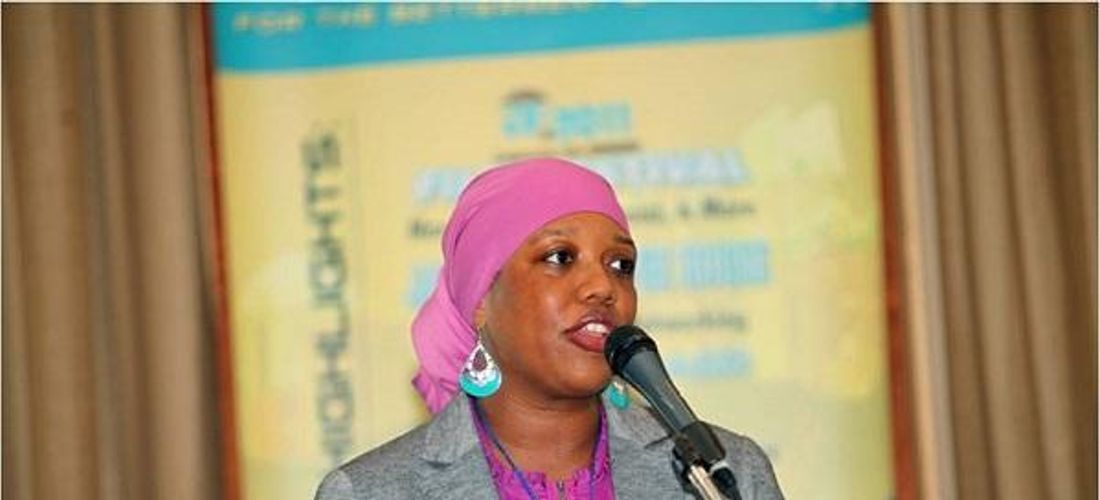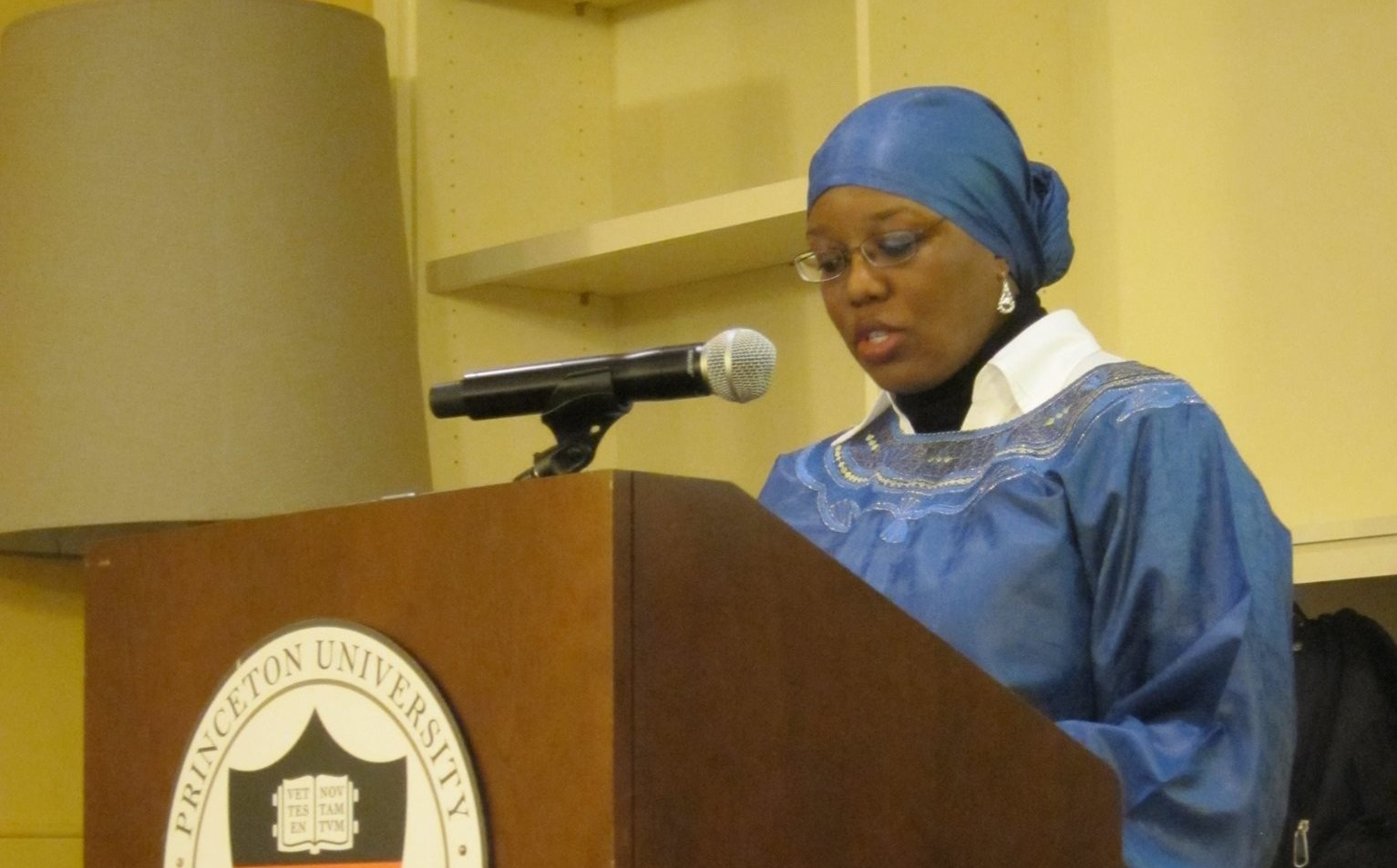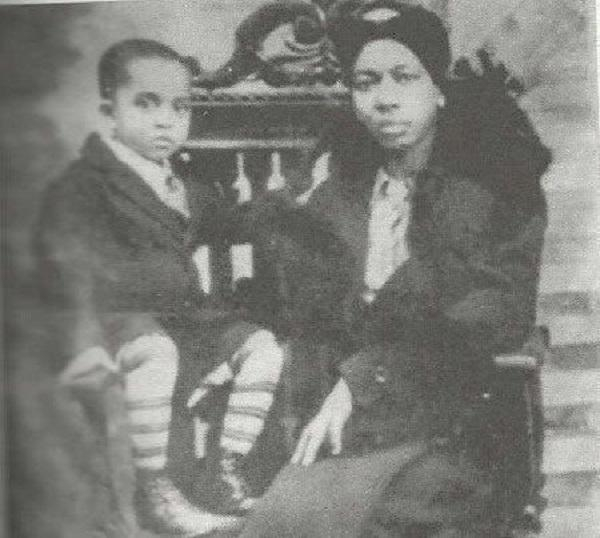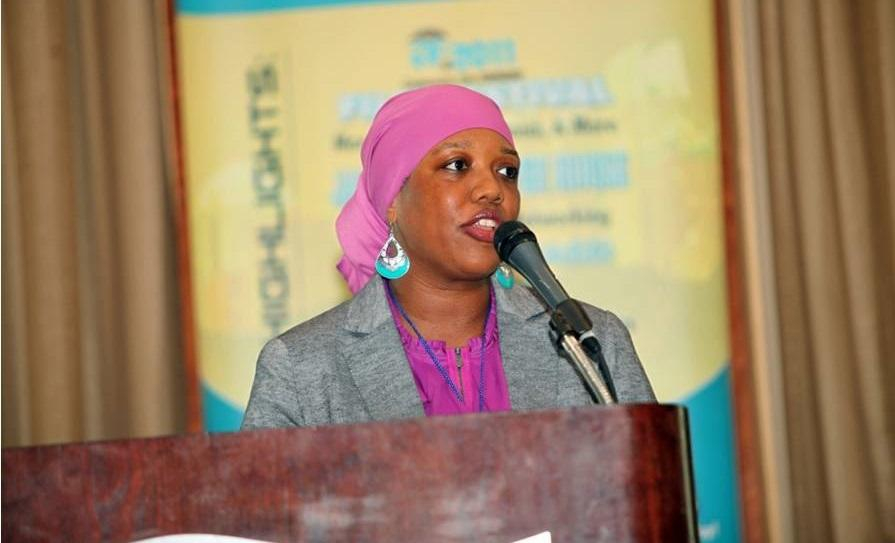The Muslim Stories We Need to Hear – Talking with Precious Rasheeda Muhammad
Community
|
Feb 28, 2020
|
13 MIN READ

By Nargis Rahman
Muslim women educators, writers, scientists, mathematicians, activists, community organizers, authors, engineers and doctors have been paving the path for centuries and continue to do so. Haute Hijab is focusing on founders and the mothers of movements for Black History Month and beyond as part of our focus on “This is What America Looks Like.”
These women have helped promote Islam in America, social justice, racial justice, promoting peace and so much more. They are inspirational leaders who strive to fulfill their roles in excellence by deriving lessons from their ancestors and mentors for guidance to live as the best version of themselves. They inspire and are inspired by those who tread before. They chose to make a difference, everyday, by showing up and staying true to themselves.
I recently spoke with Precious Rasheeda Muhammad about her work as a history detective, independent scholar, researcher, educator, author, organizer and more. She writes about the full diversity of Islam in America and the American Muslim experience as well as her own African American experience in her personal stories. Her work has been shared in books, academic journals, on NPR, at Harvard and other universities and at the State Department.
She discusses what it’s like growing up on the shoulders of dynamic African Americans who instilled in her the mindset of doing the work yourself, building community, relying on Allah’s power and mercy to get things done, and building yourself to be the best version of you.

Precious Rasheeda Muhammad giving a talk at Princeton University.
What are some different challenges you encounter when working inside and outside of Muslim communities?
I am constantly surprised how there are a lot of people who still understand very little about Islam and Muslims. The misconceptions about basic beliefs and history are sometimes so extreme, it can take your breath away. It can be a challenge sometimes as an educator to keep things basic when your mind is racing to delve deeper into things with your audience. You think, “Maybe everybody already knows this or that and now it’s time to go to the next level." So, it can be humbling because if you are really trying to educate people, in a way that builds community, it’s about slowing down to make sure you can educate people in a way that brings everybody forward somehow. It’s not about where you want to be in the lesson, it’s not about where you’re racing to go next. The same can be said, to some degree, about intra-Muslim understanding. The misconceptions run deep. The need to get the basics right is paramount. It’s challenging work, but it’s good work.
Islam in America history resource: Muslims and the Making of America
Your work holds such historical and religious significance in various Muslim communities. Which other Muslim communities could benefit from learning from your work and how?
In Islam, when we enter a new situation or environment, we are required to investigate thoroughly before coming to conclusions. And even then, when we think we are fully informed, we are to stay in a “learning from one another” mode. All of us can benefit from learning more about each other. Period. In my work, I study everyone, I write about everyone. I take really deep dives into the full diversity of our collective history, and so I have a peace in me when I am engaging with others outside my own experience as a Muslim, with a very distinct African American Muslim heritage, because I can see all the through lines and connective tissues clear as day that make the specifics of all of our stories universal. We are more alike than we are different. I think understanding that could bring others more peace, too.
That being said, if you are not learning about the African American Muslim experience, its full diversity and depth and how it is critical and foundational to your story too, you are doing it wrong.
A must read interconnected stories example: The Black Muslim American Mayor in the Home of the KKK
We all stand on the shoulders of giants in the work that we do. Your work speaks directly to that. Who do you admire from American Muslim history? Who has made contributions that have gone unnoticed or unheralded (or not heralded enough)?
I stand on the shoulders of people like Old Lizzy Gray, an African-born Muslim abducted away from her husband, children, culture, community and continent, enslaved in America from the time of the American Revolutionary War to a year before the Civil War. She is buried in South Carolina, just a short distance from where my maternal family history crosses four centuries in that same state. I could very easily be one of her descendants and not know it. She died enslaved, but the little bit she was able to pass on about life as a Muslim in Africa lives on, not in detail but in deed: That she kept telling her story of being raised and educated as a Muslim, so much so that it was mentioned in her obituary published in the New York Times in 1860.
If people like Old Lizzy Gray could carry our religious and cultural traditions forward and secure our narratives under such harsh conditions, what excuse do I have not do it and under much better conditions, though there may be challenges?
So, yes, I admire and am inspired by many men and women from American Muslim history, but any man’s name I’d mention, you’d already know, so my focus here is on the women. I’m working on projects to fix this, and so many others are too. So many Muslim women’s contributions go unnamed and unnoticed, and it’s not about the praise, it’s about the progress. We cannot progress as a people or a society when we leave out the stories of women and girls.
The first person to embrace the message of Islam from the Prophet Muhammad (saw), the first person to nurture Islam’s growth and protect its leader was a woman: Khadijah (r.a.), the businesswoman and first wife of the prophet. Do we realize as a Muslim people how important it is for every one of us to know and understand that and what it means for us today? The Quran does not leave women out, early Islamic history does not leave women out. Why are we leaving women’s stories out? And how is that impacting our progress as a people?
Every American Muslim in this country stands on the shoulders of giants like Old Lizzy Gray, whose original name we will never know because of the dehumanization she endured.
An American Muslim women’s history project example: Umi’s Archive
Who are some of your mentors? How have they inspired you?

Imam W. D. Mohammed and his mother, Sister Clara Muhammad
For most of my life I didn’t have mentors in the traditional sense (beyond my immediate family, of course) of people personally taking me under their wing and guiding me, but there are people whose examples have guided me in different ways – up close and from afar, from religion – to the arts, to entrepreneurship, to education, to philanthropy and more.
Among Muslims, they include Imam W.D. Mohammed and his mother, Sister Clara Muhammad (the largest Islamic school system in American history was named after her and influenced by her dedication to educating her children and national community); Muhammad Ali; Ayesha Mustafaa, decades-long editor of the Muslim Journal; Imam Wilmore Sadiki; Suad El-Amin; philanthropist Ibrahim El-Hibri; Amir and Habeebah Muhammad of the American Islamic Heritage Museum; Najwa and Qasim Abdul-Tawwab (my first grade teacher and principal, respectively, at Sister Clara Muhammad School in Boston); Fitrah Muhammad; Dr. Sulayman Nyang (He’d always say to me, “Precious, you must write!”); Imam Mohamed Magid; Imam Zaid and Saliha Shakir; and and so many others.
Some of these names are well known, others are not. But, they have all made invaluable contributions to the American society, to the youth, and, many of them, to the world. There are no perfect mentors, no perfect people, we are all striving every day to be better. In all the aforementioned people, including my parents and Muslim grandmother (who passed away in April 2019), I think what I have been moved by most is their constant evolution of the soul and desire to share that growth at every turn for the benefit of others growing too and how they do/did that through their particular stations in society.
Whose stories, do you think, we haven’t heard enough from our American Muslim communities? Or, whose stories have you heard that we all need to hear?
We haven’t heard enough stories of women; children, as children (we can learn so much from them); our elders, as elders (it’s a different story than they had to tell in their younger years); African Americans; Latinos; Native Americans; and people with disabilities in our communities.
A story you should know:
Experience of God – Betty Hasan-Amin (1948-2020) Betty Amin oral history interview
What has it been like to create spaces and projects in places such as Harvard University?
I grew up as a Muslim in America under the leadership of Imam W.D. Mohammed. And so I come from a national community with deep roots all over the United States, a community that is overflowing with do-it-yourself pioneers.
Everywhere I turned as a child someone was starting something to help build community, whether it was a local Sister Clara Muhammad School, like the one I attended in first grade in Boston; an intentional community, like the tens of acres one in New Medinah, Mississippi; a bottled and canned soft drink company, like Omar on the Nile; publishing and record companies releasing all kinds of creative arts throughout the country, like Wilmore Sadiki’s “Truth Music”; and on and on.
I saw a lot of this up close as a child. Thus, wherever I have been able to create spaces and projects for “building community through history” – my motto and mission – it is a direct continuance of that legacy: You see a void, you fill it, in the best of manners, for the betterment of humanity.
It’s never been alone. I’ve always worked hard to find the best teams and partners. Still, being African American, Muslim and a woman, the struggle is real, and even with partners and teams there can be loneliness in the pushing forward. In that loneliness, I remember those who paved the way for me, like Old Lizzy Gray, like Sister Clara Muhammad, and I never turn back.
What was it like organizing the 2009 Parliament of the World’s Religions? What did you learn from the experience?

Precious Rasheeda Muhammad; image soure: www.preciousspeaks.com
As a program associate, I assisted the Council for a Parliament of the World’s Religions’ Program Director in all aspects of planning the 600+ programs for the 6,000+ participants at the 2009 Parliament of the World’s Religions (considered the world’s largest interfaith gathering), including directly managing all aspects of the Muslim programs and Muslim major speakers from around the world for the entire year leading up to the Parliament.
I then provided on the ground staff support in Melbourne, Australia, during the seven-day Parliament, directly managing more than 50 Muslim-related programs and over 100 influential speakers from around the world, including from France, the United Kingdom, Nigeria, Senegal, Iran, Malaysia, Saudi Arabia, Indonesia, Israel, and Afghanistan. Among these speakers were high-ranking dignitaries, esteemed religious leaders and peace activists, renowned Islamic scholars, diplomats and more.
One of my absolute favorite speakers was the famous Quran reciter Hajjah Dr. Mariah Ulfah. I’d met her at Harvard years earlier, when she was there as part of a tour, and had kept in touch. I made sure of her participation at the Parliament as part of my effort to make sure Muslim women’s voices from around the world were included. Not only is she an amazing Quran reciter but she runs a Quran school for girls and women in Indonesia teaching them Quranic memorization and exegesis.
At the Parliament, it was beautiful to witness so many people from different faiths finding constructive ways to engage in peace and around areas of focus that could improve our world: healing the earth with care and concern; indigenous people; overcoming poverty in an unequal world; securing food and water for all people; building peace in pursuit of justice; creating social cohesion in the village and the city; and sharing wisdom in search for inner peace.
It felt really good to engage people in that constructive headspace. What I learned, or had a glimpse of in all this - from the planning (working with a team of diverse faiths striving extra hard to make sure all the traditions were represented well) and the on the ground in Australia experience – was just how truly beautiful our world full of difference could look if we could all just find a way to get along for the greater good.
You’ve also worked inside of prisons. What did you do in this work?
I’ve been to two prisons; both were maximum security. Once as a graduate student at Harvard University, I visited Sing Sing prison as part of a program called Seminarians Interacting, which was founded by the National Conference of Christians and Jews (NCCJ). Each cohort participated as part of a year-long program. We traveled to different locations at certain times of the year to learn from one another. If I remember correctly, there were students from Havard, Yale, Princeton and New York Theological Seminary. The prisoners we interacted with at Sing Sing were seminarians too through a graduate program run by New York Theological Seminary, I believe.
These prisoners, mostly African American and including Muslims too, were some of the smartest people I have ever met. It is one of the many great tragedies of the prison system that there are so many brilliant minds behind bars who could be contributing to the betterment of society. Sing Sing has the largest cell block of prisoners in the world, and most of them African Americans and Latinos. Just think of how many Malcolm Xs might be in there!
In 2010, I spoke at Maine State Prison as the NAACP Prison Branch’s Martin Luther King, Jr. keynote speaker. It’s the NAACP’s only prison branch in New England, or at least it was at the time. I’ll never forget that day because the night before, as I was practicing my speech in my hotel room, my father called and said my paternal grandmother had passed. The next day, as I tried to build community through history with the prisoners, I shared with them that I had a Muslim grandmother and a Christian grandmother and that my Christian grandmother had passed the night before and that she’d want me to keep my commitment to them and to speak in my full Muslim voice. In that moment, I wanted them to understand that interfaith engagement for me, like many African American Muslims, isn’t something we have to search for opportunities to “lean into”: We live this. Every day.
Both of these experiences were deeply meaningful for me, for so many reasons, not the least of which is my own extended family connection to the need for prison reform.
What would you like to tell people who wish to follow in your footsteps?
I think it’s a mistake a lot of times to tell people, “If you believe it, you can achieve it.” They might not believe in themselves, at least not consciously, and give up. I’ve pulled off some challenging feats in my life, and rarely have I fully believed in myself at those times. In fact, a million times a day it seems, at times, there are doubts in me that are some version of, “You can’t do this. Why did you say yes to this? You can’t do this!” The thing about me is it doesn’t matter if I believe in myself or not. What matters is that I believe in Allah’s (S) power and mercy. As long as I am doing something that is not in the wrong, I believe Allah (S) will see me through it.
I believe in the power of prayer. Pray through the doubts. Set your mind on the task at hand. Lock in on it. Don’t let it go until the job is done and is done well like no one else can do it. That’s what I do. We are taught as Muslims, and this is from the Quran, we get nothing but what we strive for.
What are some ways a person can balance their family, social and professional lives?
A lot of my friends struggle with balancing family, social and professional life. I struggle with this. When I was helping plan the Parliament, at one point I had to be in Chicago at the Council’s headquarters for a week. I had a ten-month-old daughter and a two-year-old daughter. I was still breastfeeding my baby, so I took her with me; my husband balanced his work and childcare with our other child. I rented an apartment in Chicago for a week. I brought in my mother. I pumped milk every day to leave with my mother for my baby while I was with my colleagues. I couldn’t have done it without that support. You have to have a good support team.
Our society isn’t really set up for balance. It seems like everything is too often manifested in extremes. As Muslims, however, we have to be striving for balance in all things. So praying is important, for example, but we shouldn’t be praying all day to the point where we have no time left to make any positive contribution to our communities or to the point where we are ignoring our families.
Two of the best pieces of advice on balance I’ve gotten from women: Don’t let other people’s poor planning become your emergency, and “having it all” is relative, but you can somewhat have it all if you do things in stages.
Now, the part about other people’s poor planning is really key for us as women because we are often carrying a lot on our shoulders across all areas of life and that goes unrecognized, so we cannot allow other people’s poor planning to pull us off course. I tell people all the time, and this is especially important when you have a family: I don’t do last minute.
Have you experienced people policing the way you cover or dress? If so, how do you handle the haters?
At this stage in my life, I don’t really experience any direct policing in the way I cover or dress, but when my fellow Muslim sisters do, whether people I know personally, or from something I hear in the news, or see shared on social media, I feel it too. And so it feels like this policing is a constant in my life, even though it’s not touching me personally.
How has your upbringing impacted where you are now?
I wrote about this in the 2005 book, Living Islam Out Loud: American Muslim Women Speak. Here is how my chapter, “To Be Young, Gifted, Black, American, Muslim, and Women,” opens:
I am young, gifted, Black, American, Muslim, and woman—a medley of identities and intercultural exchanges at a defining moment in world history. I carry the torch of an Islam predicated upon universal human excellence, to the chagrin of cynics who claim it impossible for the faith itself to do so, let alone someone of my ilk. Yes, marginalization is a challenge even for me, the daughter of revolutionaries. But I, like many before me, am a “movement child.” Even while I am still struggling for traces of cool air—feverish with the need to personalize my faith in the face of my intersecting identities and what Islam means to me beyond what I have been taught and what I am expected to be—I have taken to heart the responsibility to carry the torch of this faith and, as a believing woman, to actively represent Islam through contributions to humanity every day that I live.
You can read the rest of it here: "To Be Young, Gifted, Black, American, Muslim and Woman."
Subscribe to be the first to know about new product releases, styling ideas and more.
What products are you interested in?

